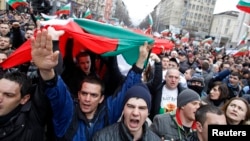SOFIA —
Bulgaria's parliament moved to cut electricity prices on Wednesday, an attempt to defuse public anger that had forced the government out, which risked undermining confidence in the economy.
Adding to a sense of political limbo in the European Union's poorest state, outgoing Prime Minister Boiko Borisov has been hospitalized with high blood pressure before an interim government has been appointed to take the country to early elections.
Six years after joining the bloc, Bulgaria trails far behind other members. Its justice system is subject to special monitoring and its citizens are excluded from the passport-free Schengen zone because of other members' concerns on corruption.
Many protesters say they are angry with Bulgaria's whole political class, causing more uncertainty over the upcoming election, and government concessions raise the risk of a widening deficit and market pressure.
After demonstrators attacked power company offices and three people set themselves on fire, parliament passed a law allowing electricity prices to be cut by a promised 8 percent from March. That will further hurt electricity distributors — Czech companies CEZ and Energo-Pro and Austria's EVN — which are already the focus of protesters' ire.
"The situation is tragic. We need a radical a change — people took to the streets due to total misery," said Sergei Stanishev, leader of the opposition Bulgarian Socialist Party (BSP).
Borisov — a former bodyguard to communist dictator Todor Zhivkov — resigned last week after two weeks of sometimes violent protests by tens of thousands accusing the government of being a "Mafia" due to rampant corruption and its failure to improve living standards.
Borisov's departure has failed to fully calm voters in a country where the average monthly wage is 400 euros ($520) and pensions are less than half that amount. Demonstrations have continued on a smaller scale, though large protests are planned for the weekend.
The outgoing premier has even risked a diplomatic row with the Czech Republic and EU by threatening to withdraw CEZ's license, and prosecutors are investigating the power companies' prices and other possible malpractices.
The electricity distributors say they have done nothing wrong.
Borisov remains in office until an interim government is appointed, probably next week, to hold the reins until elections, which are expected in May. Hospital officials said he was admitted with hypertension earlier this week but should be discharged later in the day. A cabinet meeting due on Wednesday was postponed due to the prime minister's absence.
Borisov's GERB party is now running neck-and-neck with the BSP and neither is expected to win a majority. Whichever coalition forms a government, it will be under significant pressure to spend more.
Low living standards
Borisov has maintained tight fiscal discipline and brought the budget gap down to 0.5 percent of gross domestic product, important to maintaining confidence in Bulgaria's currency peg to the euro.
But living standards remain less than half the EU average and public anger spilled over when bills for electricity, which many people use for heating, suddenly rose in cold weather following a 13-percent hike last July.
Parliament changed the law to allow regulators to alter prices more often than the current once a year, which would allow the cut promised by Borisov a day before he resigned.
Even though the government will only see a slight fall in sales tax revenues, its concessions mean the next administration will be under pressure to further loosen the purse strings.
"The changes introduce a great deal of uncertainty on the market," said Nikola Gizmo, head of Bulgaria's photovoltaic energy association.
The attacks on the distributors may also deter investors by highlighting the risks of business in Bulgaria.
The economy is only slowly recovering, with growth of about 1.4 percent expected this year, which does little to raise living standards.
"We need some new faces that have the energy and desire to revive the current parties," said Konstantin Haralampiev, 47, an entrepreneur in Sofia.
Adding to a sense of political limbo in the European Union's poorest state, outgoing Prime Minister Boiko Borisov has been hospitalized with high blood pressure before an interim government has been appointed to take the country to early elections.
Six years after joining the bloc, Bulgaria trails far behind other members. Its justice system is subject to special monitoring and its citizens are excluded from the passport-free Schengen zone because of other members' concerns on corruption.
Many protesters say they are angry with Bulgaria's whole political class, causing more uncertainty over the upcoming election, and government concessions raise the risk of a widening deficit and market pressure.
After demonstrators attacked power company offices and three people set themselves on fire, parliament passed a law allowing electricity prices to be cut by a promised 8 percent from March. That will further hurt electricity distributors — Czech companies CEZ and Energo-Pro and Austria's EVN — which are already the focus of protesters' ire.
"The situation is tragic. We need a radical a change — people took to the streets due to total misery," said Sergei Stanishev, leader of the opposition Bulgarian Socialist Party (BSP).
Borisov — a former bodyguard to communist dictator Todor Zhivkov — resigned last week after two weeks of sometimes violent protests by tens of thousands accusing the government of being a "Mafia" due to rampant corruption and its failure to improve living standards.
Borisov's departure has failed to fully calm voters in a country where the average monthly wage is 400 euros ($520) and pensions are less than half that amount. Demonstrations have continued on a smaller scale, though large protests are planned for the weekend.
The outgoing premier has even risked a diplomatic row with the Czech Republic and EU by threatening to withdraw CEZ's license, and prosecutors are investigating the power companies' prices and other possible malpractices.
The electricity distributors say they have done nothing wrong.
Borisov remains in office until an interim government is appointed, probably next week, to hold the reins until elections, which are expected in May. Hospital officials said he was admitted with hypertension earlier this week but should be discharged later in the day. A cabinet meeting due on Wednesday was postponed due to the prime minister's absence.
Borisov's GERB party is now running neck-and-neck with the BSP and neither is expected to win a majority. Whichever coalition forms a government, it will be under significant pressure to spend more.
Low living standards
Borisov has maintained tight fiscal discipline and brought the budget gap down to 0.5 percent of gross domestic product, important to maintaining confidence in Bulgaria's currency peg to the euro.
But living standards remain less than half the EU average and public anger spilled over when bills for electricity, which many people use for heating, suddenly rose in cold weather following a 13-percent hike last July.
Parliament changed the law to allow regulators to alter prices more often than the current once a year, which would allow the cut promised by Borisov a day before he resigned.
Even though the government will only see a slight fall in sales tax revenues, its concessions mean the next administration will be under pressure to further loosen the purse strings.
"The changes introduce a great deal of uncertainty on the market," said Nikola Gizmo, head of Bulgaria's photovoltaic energy association.
The attacks on the distributors may also deter investors by highlighting the risks of business in Bulgaria.
The economy is only slowly recovering, with growth of about 1.4 percent expected this year, which does little to raise living standards.
"We need some new faces that have the energy and desire to revive the current parties," said Konstantin Haralampiev, 47, an entrepreneur in Sofia.









